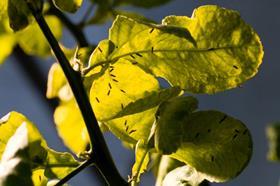
University of Florida (UF) scientists are working towards establishing a new biological method that may help farmers control the insect that transmits citrus greening disease into trees.
According to UF, greening is present in about 95 per cent of the citrus trees in Florida, so using a virus that may kill the insect will allow growers to reduce the need for pesticides.
Instead of spraying insecticides, scientists hope to harness the natural enemies of the Asian citrus psyllid to manage the invasive pest, according to UF/IFAS plant pathologist Ozgur Batuman.
Batuman is leading a UF/IFAS research team investigating viruses that live in the digestive system of the psyllid, which transmits the bacterium responsible for greening by feeding on a citrus tree's new shoots and leaves.
The early results are promising, with research suggesting a natural process that would kill the insect or at least prevent greening from being transmitted.
'This invasive pest is now established throughout Florida's commercial groves, so growers use insecticide sprays that are potentially harmful for the environment as one of their primary tactics for fighting citrus greening,' said Batuman. 'By reducing psyllid populations in their groves, growers hope to increase the quality of fruits and the productive lives of their trees by minimising the number of times a tree is exposed to the greening pathogen.'
To arrive at their results, Batumen and his team spent two years collecting psyllids from commercial groves in 22 central and south Florida counties, from Lake and Orange counties in the north to Martin County in the southeast and Collier County in the southwest.
By using a test that amplifies DNA, scientists found five viruses in the guts of the psyllids they collected, and they now believe that they can use those viruses to control the psyllids that live in the groves from where they were collected.
'Future experiments will investigate how these viruses can be manipulated so that they may alter the psyllids biology,' said Batuman. 'We also need to find out how the viruses affect survival and transmission of the bacterium that causes citrus greening disease, also known as huanglongbing or HLB.
'By understanding how the viruses interact with the pysllid biology, we may be able ti understand how to better control the psyllids,' he added.



